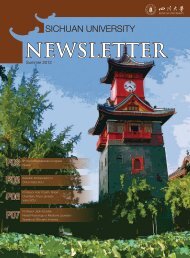Reflexive inquiry in organizational research: Questions and ...
Reflexive inquiry in organizational research: Questions and ...
Reflexive inquiry in organizational research: Questions and ...
You also want an ePaper? Increase the reach of your titles
YUMPU automatically turns print PDFs into web optimized ePapers that Google loves.
988<br />
Human Relations 56(8)<br />
process (ma<strong>in</strong>stream <strong>research</strong>), <strong>and</strong> the logic of the Glance, which is<br />
concerned with motion, peripheral vision, an unfocused field of experience<br />
we attempt to construct cont<strong>in</strong>ually (reflexive <strong>research</strong>).<br />
Deconstruction (Derrida, 1976) is an example of this form of reflexive<br />
analysis. <strong>Reflexive</strong> deconstructive ethnography sees organizations as texts (an<br />
<strong>in</strong>terplay of discourses <strong>in</strong> experiences, events, writ<strong>in</strong>gs etc.) <strong>in</strong> which<br />
dom<strong>in</strong>ant <strong>and</strong> straightforward underst<strong>and</strong><strong>in</strong>gs <strong>and</strong> practices are questioned<br />
<strong>and</strong> contradictions exposed. Self is an effect of discourse, or speech acts, or<br />
caught <strong>in</strong> a cha<strong>in</strong> of significations: a site constituted by symbolic, discursive,<br />
socio-historical, often contradictory <strong>and</strong> uncontrollable forces (L<strong>in</strong>stead,<br />
1993a, 1993b). Research is an <strong>in</strong>tertextual space where texts, participants,<br />
<strong>and</strong> l<strong>in</strong>guistic conventions <strong>in</strong>terweave (Kristeva, 1984; Tyler, 1986), <strong>and</strong><br />
where mean<strong>in</strong>g <strong>and</strong> the relationship between author, text, subjects <strong>and</strong> reader<br />
are open to reflexive scrut<strong>in</strong>y. With<strong>in</strong> the field of organization studies, writers<br />
have responded to this challenge by deconstruct<strong>in</strong>g management ideologies,<br />
power relations, management theory, <strong>organizational</strong> practices, <strong>and</strong> how<br />
narratives may regulate social experience. Clair (1997), for example, studies<br />
the discursive enactment of oppression <strong>and</strong> resistance, illustrat<strong>in</strong>g the<br />
complexities of discursive relations by us<strong>in</strong>g oppositional logic to suggest<br />
that acts of oppression are also acts of resistance, <strong>and</strong> vice versa.<br />
The second approach to reflexivity betweeness, is rooted <strong>in</strong> the discipl<strong>in</strong>es<br />
of cultural anthropology, sociology <strong>and</strong> social constructionism <strong>and</strong><br />
draws attention to the constitutive nature of language (Clifford & Marcus,<br />
1986; Garf<strong>in</strong>kel, 1967; Shotter, 1993). Social constructionists argue that we<br />
construct <strong>and</strong> make sense of social realities <strong>in</strong> various forms of discourse;<br />
conversation, writ<strong>in</strong>g, <strong>and</strong> read<strong>in</strong>g. Radically reflexive <strong>research</strong>ers recognize<br />
their own place <strong>in</strong> this process, suggest<strong>in</strong>g we construct <strong>in</strong>tersubjectively the<br />
very objective realities we th<strong>in</strong>k we are study<strong>in</strong>g: we are <strong>in</strong>ventors not representers<br />
of realities (Clifford, 1986). Constructionist <strong>research</strong> explores how<br />
mean<strong>in</strong>g is created between <strong>research</strong> participants. For example, Boje et al.<br />
(1999) exam<strong>in</strong>e how three storytell<strong>in</strong>g organizations (a choral company, a<br />
group of <strong>research</strong>ers, the journal editor <strong>and</strong> reviewers) construct a <strong>research</strong><br />
story. Katz <strong>and</strong> Shotter (1996) focus on arrest<strong>in</strong>g moments <strong>in</strong> conversations<br />
between residents, medical patients, <strong>and</strong> a collaborative consultant (Katz) to<br />
explore how mean<strong>in</strong>gs <strong>and</strong> new underst<strong>and</strong><strong>in</strong>gs are created between participants.<br />
As can be seen from the examples given above, whether one takes a<br />
deconstructionist or constructionist approach has a major impact on how<br />
one studies <strong>organizational</strong> life. A further dist<strong>in</strong>ction <strong>in</strong>fluences our mode of<br />
<strong><strong>in</strong>quiry</strong>, whether as a reflexive <strong>organizational</strong> <strong>research</strong>er we take an endogenous<br />
or radical approach (Pollner, 1991). Deconstructionist <strong>and</strong> many


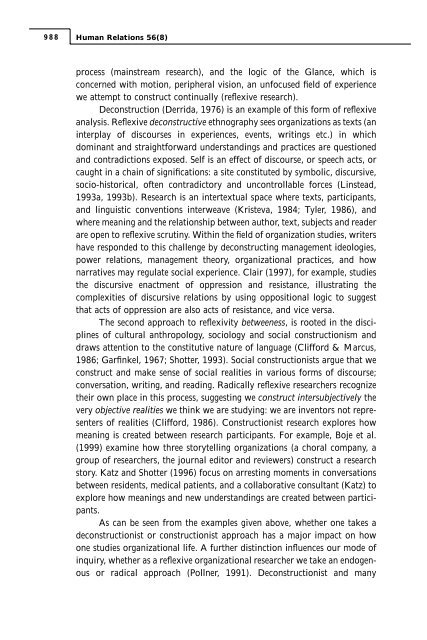
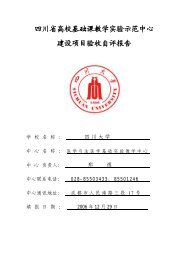
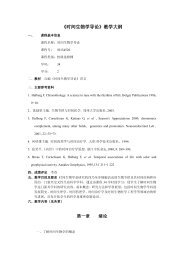
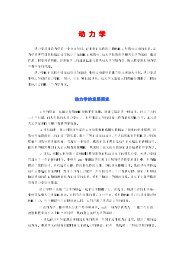
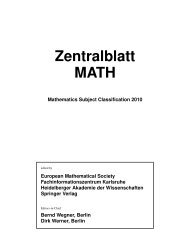
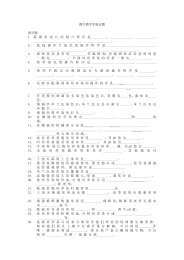





![第10 ç« æ¢ç弯æ²åºåMPa 30 MPa 36 kN/m 5.4][ = q = ][q](https://img.yumpu.com/29939822/1/184x260/c10-c-aeca-1-4-aeaampa-30-mpa-36-kn-m-54-q-q.jpg?quality=85)


